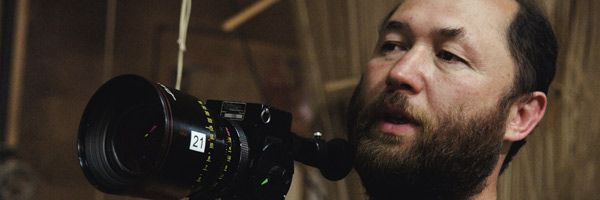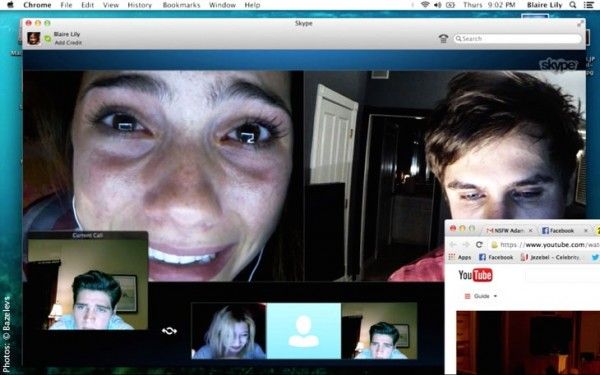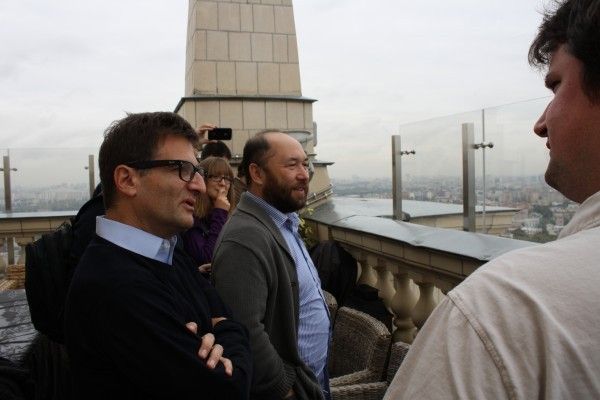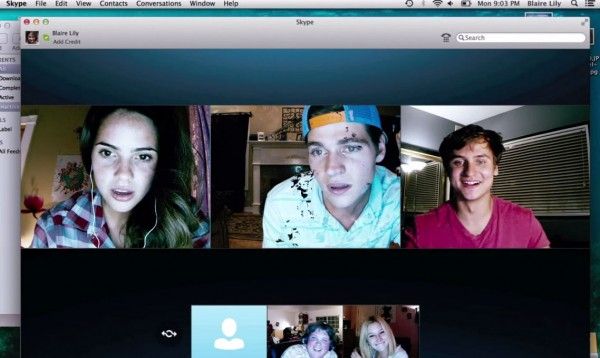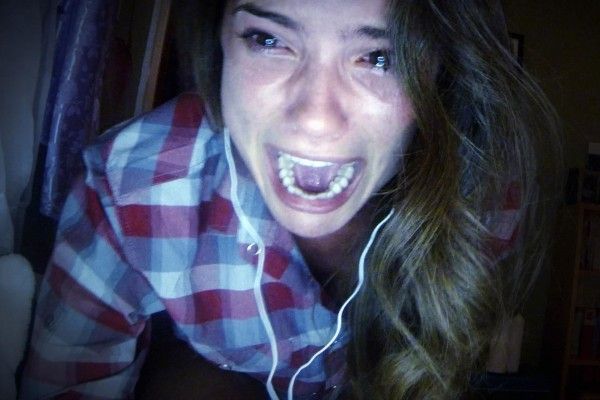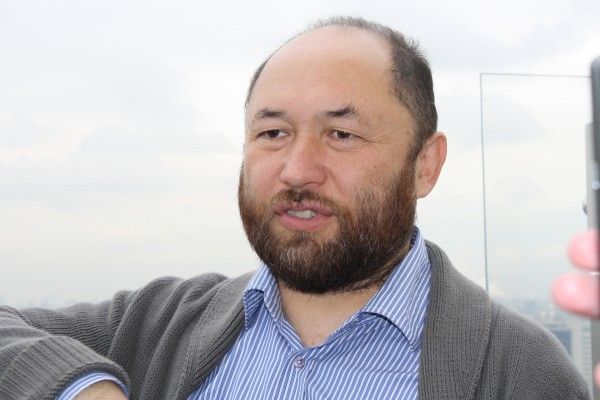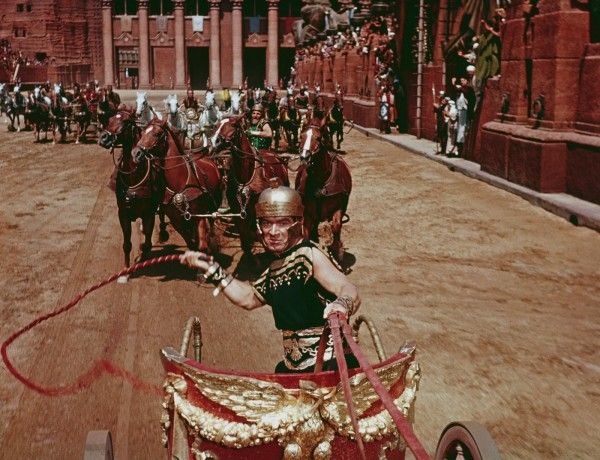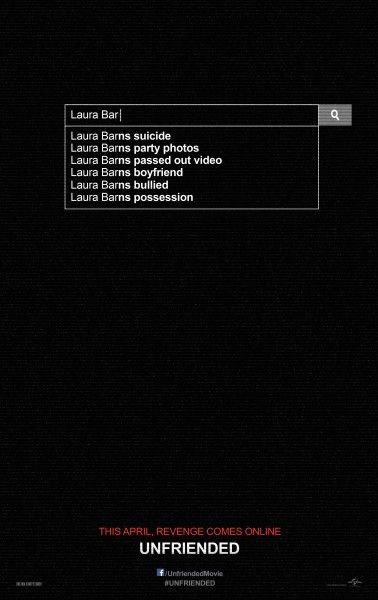Unfriended is a low budget horror film produced by Timur Bekmambetov. The film takes place entirely on a laptop screen and features six teenagers communicating via Skype when someone unexpectedly joins their call, someone who claims to be a girl named Laura Barns, a classmate of theirs who committed suicide a year ago. Soon after the first Unfriended trailer hit the web, it collected millions of views. It’s also racked up some serious social media attention with 261,951 tweets using the hashtag #Unfriended published in a single day, beating Fifty Shades of Grey’s record of 240,697 tweets the first day its trailer was released.
The found footage genre has been long mastered by the authors of horror films, but Unfriended is still considered to be a fresh take not only in the genre, but also in cinematic language. Unfriended sparked a huge stir at the Fantasia International Film Festival in the summer of 2014. Good reviews and positive buzz even led the organizers to arrange an additional screening.
A few days ago I had the chance to talk to Bekmambetov via Skype while he’s in Rome working on Ben-Hur. He told me about the danger of cyber attacks, discussed the absence of ethics in the modern Internet life, the production difficulties on Unfriended, an experience of being mocked as a teenager, the status of Wanted 2, and more. Check it all out in the interview below.
Timur, tell me about the beginning of the story; how did the idea for Unfriended first come to you?
Oh, it happened long ago. My colleague from Bazelevs (Timur Bekmambetov’s production and distribution company) Leo Gabriadze, who I've known for twenty years now, was the first person to bring an Apple Macintosh from Los Angeles in 1985. It was the first computer I saw in my life, which became my life’s main instrument. I refused to leave it for a single moment after I got it all those years ago. And so it happened that since then, I started living between Russia and America. And that is why I spend a lot of time in my computer writing letters, communicating on Skype, meeting people online, working, and so on and so forth. At a certain moment I realized that my life is mostly taking place in the virtual world. All my communication, my main emotions and events, happen online. They get to me through the screen, which means that my computer is my window to the world.
Once, I was talking to my colleague on Skype. That was at the time when the feature “sharing a screen” has just appeared in the service. We were discussing some materials for the movie, for its promo campaign, so it was really convenient for us to use that option. While still talking to me, he forgot to turn the “sharing” off after showing me the materials. So as the Skype conversation continued, I saw everything that was happening on his screen. I saw him sending letters to someone, looking through some websites, messaging someone about me, sending something on the printer, watching YouTube videos with kittens. So I saw everything he was doing while talking to me about our problems in a very serious tone. And at that moment I suddenly realized that if a viewer could look at the character’s monitor, he would be able to know everything about the consciousness of the person, about who he is. It was such enlightenment for me. I wanted to explore this matter further, I wanted to explore the will to tell your computer about your life, and also the will to share everything inside the social networks.
But, I did not have time for that. While being really busy with other projects, I was still talking to people about this idea which would not get out of my head. I was telling everyone that I found the future of cinematography. I was absolutely sure that we will be able to know ourselves and our lives better only when we start making movies about our computer screens. Once, I shared this idea with Nelson, my assistant, who was in Los Angeles with me at the time. He took this idea far more seriously than anyone else. So I told him: “Write a story, a plot line for such an idea, and I will immediately start a production of it, I promise. Just choose any genre. A horror, for example. But it has to be based on a real story, because the audience will feel if there is going to be any imitation, any cheating in the story. The internet is too familiar to everyone. The story has to be real!” I don’t really remember now what else have we discussed, but soon after our conversation Nelson appeared and told me a story that happened to his classmates, who he has been studying with in a little town in California. When he gave me the script, I didn’t even change a single word, I just sent it to pre-production, as I have promised.
There was, of course, a question about who is going to be a director. I realized that the only person I could ask to make the project with me was Leo Gabriadze, the person who it has all started with, when he brought me that Apple Macintosh all those years ago. He had so much inner freedom in him and an understanding of the style that I wanted to get that I did not need to think twice; he was exactly the person to direct Unfriended. He read the script, liked it and so the production has started.
Timur, you knew from the start that certain risks are going to be faced, as a lot of technologies had to be created and experimented with at the time of production. How were you dealing with it from the start?
Yes, we had a great understanding that we will be the first people to master the laws of this new cinema language. We were happy to be the first explorers. No one knew how to shoot this kind of a movie. But it was so interesting that all the difficulties in production did not cause us any stress. We were so curious, that everything else just became the background. I had formulated the main rules from the start. I was convinced that the film should take place in real time. It was one of the main laws of this new cinema language. An audience should feel that the events happening on the screen are happening in the real time. There should have been no sense of editing, jump cuts, any type of editor’s usual intervention. The viewer should stay online, connected with the screen.
The second important law was the following: there should have been a feeling that everything was real, that the people on the screen can be your friends, neighbors, any people you could potentially know. So all the actors should have been unknown to the audience.
The third and most important rule was that people had to be sure that the sound heard from the theatre screen is the sound coming from an actual computer the audience is seeing. There should have been no composed music, as well ....
But at the same time, you had additional Go-Pro cameras on the screen of each computer, and there was a separate sound recordist in each room of each actor. So you were recording the sound and filming the image on few additional devices...
Yes, of course, it helped us a lot to immerse the audience into an illusion of an online Skype conference. As I knew that I wanted the film to be theatrically released, the quality had to be good. We invented special devices, which had to fully imitate the Skype conference. We rented out a house in Los Angeles in order to place the actors in six different rooms where they could only hear each other through computers or headphones. It was essential that everyone was at the same place, as our editors were editing the film right on the spot, while the material was being filmed. They were also connecting the material with all the graphics of the computer screen that was prepared for them in advance. We were making the whole movie with one take, which lasted 80 minutes. Everything else was graphics of a computer screen.
The actors did a really great job, memorizing a lot, rehearsing all the time. They had to remember so much dialogue, and so many reactions regarding so many different characters and actions at the same time. They were improvising a lot as well. We decorated each room differently so that it would seem like these were different houses they were in. We also tried to give each one of them a special personality that would also be seen through every tiny detail of their room’s interior.
So what do you think, what is the main reason for such a sudden success? At first you thought that all the distributors will be quite skeptical about such a format. You were even going to put the film online, on the web, as you didn’t think you were going to get any support from the major studios.
Yes, it was very important for me that millions of people could see this film. I wanted to achieve it at any cost. I think it is very important for all young people to see this movie. There are a lot of actual questions in the film about how teenagers are reacting to different kinds of attacks, not only in the internet. It is a huge problem nowadays. The number of children committing suicide grows every day. Nowadays the evil thinks that it can get away with anything. And the main reason for it is anonymity, and the fact that the spread of information happens quicker than ever, but at the same time people think that there is far less responsibility for their actions.
It is so scary, that everyone thinks that one can say and do online everything one wants, as nobody will find out.
Yes, it is scary. The most important thing is that evil used to be forgotten quite quickly when there was no internet. And as soon as it appeared, all the evil started being saved and stored. Nothing ever disappears from the web. No matter how hard you try. If someone makes something bad online, it will stay there forever. In the memory. So the question of forgiveness is no longer the same. Nowadays even forgiveness from God is not enough. No one will forget the evil, the harm made, since the web continues to remember every single word and action. People will be judged independently from God from now on. And the worst thing is, every human being considers himself a God online.
Timur, the main evil in the film is the girl who was mocked online by her own classmates, which led to a chain of horrible events. When you were studying at school, which side were you on? The “cool” guys, or those who are getting mocked?
I don’t remember it that well, to be honest. I think I went from one group to the other at some point. I was an intelligent kid from an intelligent family. And there were a lot of cool hooligans in the schools. I was on the lower step of the hierarchy, but once one of the main gang leaders forced me into a fight. I don’t know how it happened, but I had beaten him up. Accidentally. And so in a flash I moved up from a lower caste to an upper one. I actually started to forget that things like that were also happening when I was younger. Adults always tend to think that the times are changing and they keep forgetting what is it like to be a teenager, especially a teenager who is getting mocked and bullied. It is important to remember how hard it is and to support the loved ones, whether it is your child or a friend or a relative. And every period of time should have its own movie attracting the attention to the issue. When I was young, my film to relate to was called Scarecrow. It is a Russian film with the talented Kristina Pugacheva. I hope that the film of a new generation will be Unfriended.
You are now in the process of directing your third Hollywood feature film Ben Hur. Can you talk a bit about the project? Are you excited to be on board?
Oh, I am so thrilled and excited. It is such an honor for me, as a director, to be entrusted with this project. I did not really care whether it would be a Hollywood scale or not. I just wanted to tell this story the way I see it, and share my perception of it with the audience.
How different will the new Ben-Hur be from the original version?
When we say “original Ben-Hur,” we have to be very concrete about which original version we are talking about. The are two big screen versions made, in 1926 and 1959. These are the two most famous ones. There was also a Broadway stage version at the beginning of the century. There have been a lot of television versions. The Ben-Hur story reminds me of “Romeo and Juliet,” “Hamlet,” and any story written by Chekhov. It is timeless, so every new generation wants to go back to it in order to adapt it for the new world. The screen version made in 1959 runs for four hours, and there is only a small number of people who can actually stay through the whole movie. It is about people different from us. And it’s normal, because people used to be different. The audience was different, too, as well as the cinema language the film was made in. The 1959 movie was about revenge, not about forgiveness. For me that was the main problem, as I think that the novel is mainly about forgiveness, about the fact that a human being learned how to forgive. I got so excited about the project when I read John Ridley’s script. I understood that John’s vision of the story has so much light to it, and that he shares the same thoughts about a certain morals as I do. We talked with him about our modern world, which actually reminds me very much of a huge Roman Empire. In the Roman Empire, the most important important values were pride, rivalry, power, strength, the dictatorship of power and self-love. This kind of world does not have any prospects today. Humanity has to learn how to love and forgive. This would be our only solution.
Timur, there are a lot of rumors about Wanted 2 starting its development at Universal. Could you say if there is a possibility of this project seeing the light in theatrical release in the future? Or is it just a rumor?
I really wish there would be a sequel of Wanted. I would be so happy to work with James, Konstantin and Angelina again. This film has influenced my film career in the USA a lot. It means a great deal to me. Unfortunately, Universal is still thinking about the possible dates of the pre-production start. I know that the movie should be released, but it’s all up to Universal to decide when is it going to happen. The studio has to think about it longer and has to make a right decision. For my part, I have the concept of the new story already. I have all the scriptwriters and co-producers on board. I’ve seen that some websites have even posted the posters of Wanted 2! I think there are a lot of people waiting for the second part of the story we made in 2008.

